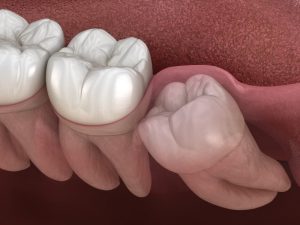Wisdom teeth, also known as the third molars, are the last of your pearly whites to develop. They usually come in during the last years of being a teenager or early adulthood—between the ages of 16 and 24. While wisdom teeth can oftentimes develop without any issues, they can cause issues for some people. In some cases, the third molars can become impacted below the gumline, leading to oral health issues. Read on to learn four problems that can result from impacted wisdom teeth and what to do about them.
#1. Pain
One of the major signs of having difficulty with your wisdom teeth is oral pain. You may experience a dull throb and then it grows in severity. This can especially be true if they’re trapped below the gumline. This causes the impacted teeth to press against the surrounding teeth and put pressure on the oral tissues as they attempt to break through the gums. The major discomfort caused by impacted wisdom teeth can even spread to the jaw.
#2. Cavities
When wisdom teeth have not emerged fully, it can begin to be a challenge to properly care for them and the surrounding teeth. When it’s hard to brush these hard-to-reach areas, bad bacteria and plaque can begin to build up, leading to tooth decay.
#3. Gum Disease
Gum disease occurs when the soft oral tissues of the mouth become infected. If you are unable to fully brush and floss due to impacted wisdom teeth, your gums can begin to become inflamed as the bacteria grow on them. This can lead to bleeding gums, receding gums, and eventually tooth loss.
#4. Cysts
Teeth first develop in small sacs that are within the jawline. If they fail to fully emerge from their sacs, fluid can begin to fill the sacs. Unfortunately, this increases the chances of cysts beginning to develop. These cysts can place pressure on the roots of your surrounding teeth, leading to jaw and nerve damage.
What’s the Best Way to Treat Impacted Wisdom Teeth?
Generally, the only way to treat impacted wisdom teeth is to surgically remove them. While this may sound scary, it is actually a very painless procedure with sedation. By accessing the impacted teeth through the gums, your dentist can break them up into smaller pieces and then easily remove them. To end the procedure, they will apply sutures so your mouth can properly heal.
Impacted wisdom teeth are not only uncomfortable but can lead to other oral health issues. By visiting your dentist as soon as possible, you can get your smile back on track to comfort and health!
About the Author
Dr. Jennifer Pham and her team at Downtown Family Dental of Leesburg are eager to help keep your smile whole, healthy, and beautiful. She earned her Doctor of Dental Medicine at Temple University School of Dentistry and has completed several advanced courses in various branches of dentistry. With a 5-star rating on Google, she offers a comprehensive range of services, including emergency care. To schedule an appointment, contact her through her website or call (703) 666-3867.

